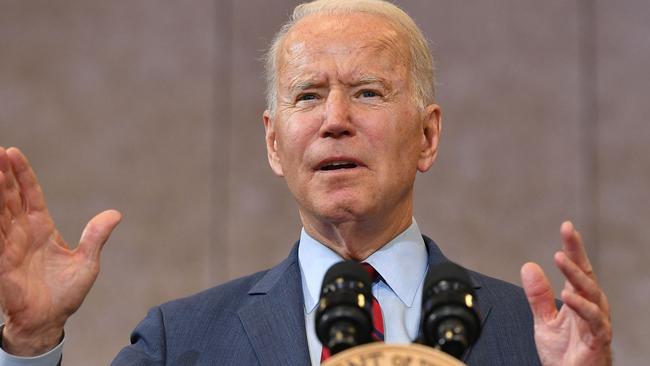Joe Biden begins America’s rebuild
Joe Biden has hailed a bipartisan agreement to spend hundreds of billions of dollars on infrastructure.

Joe Biden has hailed a bipartisan agreement to spend hundreds of billions of dollars on infrastructure, in a move that is set to resolve one of the most rancorous issues he has faced in office.
A group of 10 centrist senators, five from each side, indicated that they had agreed to a deal to rebuild America’s ailing roads, airports and broadband system. Without such an agreement, the US President had warned that the US faced losing its competitive advantage over countries such as China.
While the precise details of the package have yet to be put to other senators, there is likely to be $US559 billion ($736bn) of new money, with cash diverted from other areas to top up the total package of $US1.2 trillion, spread over eight years.
Flanked by some of the senators at the White House on Thursday (Friday AEST), Mr Biden said that compromises had been made on both sides.
“We have a deal,” he said, thanking the senators. “We’re used to giving each other our word. They have my word, I’ll stick with what they’ve proposed.”
Mr Biden won the White House partly on his promise to work with both parties to get deals done. He initially said he wanted commitments of more than $US2 trillion for infrastructure spending.
He was accused by Republicans of trying to stretch the definition of infrastructure by including social measures such as free community college places and childcare subsidies. The administration has described the social aspects of its policy as “human infrastructure”.
The President admitted that the group of senators had cut some of those aspects out of the agreement, and said that he would try to use a mechanism in the Senate that would allow Democrats to force through the additional measures as part of budget legislation.
He described the deal as “breaking the ice that too often has kept us frozen in place and prevented us from solving the real problem facing the American people”.
Mr Biden stressed that the massive plan – which includes the largest investment in US bridges and public transport – met his requirement of not raising taxes on anyone making under $400,000 a year.
“We’re going to do it all without raising a cent” in new taxes, he said. Instead, the plan was to boost enforcement of existing tax law to recover under-reported taxes from wealthier Americans.
The talks had looked difficult when moderate Democrats, notably Joe Manchin and Kyrsten Sinema, said they could not support an expansive deal. They teamed up with other centrist Democrats and five Republicans including Mitt Romney and Susan Collins, who was invited for personal meetings with Mr Biden.
Rob Portman, a Republican flanking the President during his announcement, said: “We didn’t get everything we wanted but we came up with a good compromise that is going to help the American people.”
As well as roads and bridges, Senator Portman said the deal included provisions for broadband, water and rail systems.
There is likely to be some resistance on both sides. Some Republicans want only a bare minimum of spending, although most are likely to support what they see as traditional infrastructure. They see the political advantage of new roads and bridges, and the jobs they bring, especially if they are in the senators’ own states.
Some on the left do not think the administration is going far enough. Left-wing independent Bernie Sanders said he was sick of hearing from the likes of Senator Manchin.
Republican senator Bill Cassidy called the bill “great progress”. “A bridge is coming near you. Not right away, not tomorrow, not next year,” he said. “But we’ve begun the process.”
The deal will need the support of 60 of the Senate’s 100 members to be passed. The seats are presently divided equally between the two parties.
Despite that, Mr Biden has pursued an ambitious legislative program, including bills on gun control, police reform and voter protections.
The administration fears that after next year’s midterm elections the Republicans will have a majority in the Senate.
The Republican leader in the Senate, Mitch McConnell, has repeatedly said that infrastructure is an area of potential bipartisan agreement, but has not yet signed on to the group’s deal.
“The devil’s in the details and we’ll have to make sure there’s not some kind of hidden tax increase in there, and I want to see that it’s credibly paid for,” he said.
THE TIMES, Agencies



To join the conversation, please log in. Don't have an account? Register
Join the conversation, you are commenting as Logout